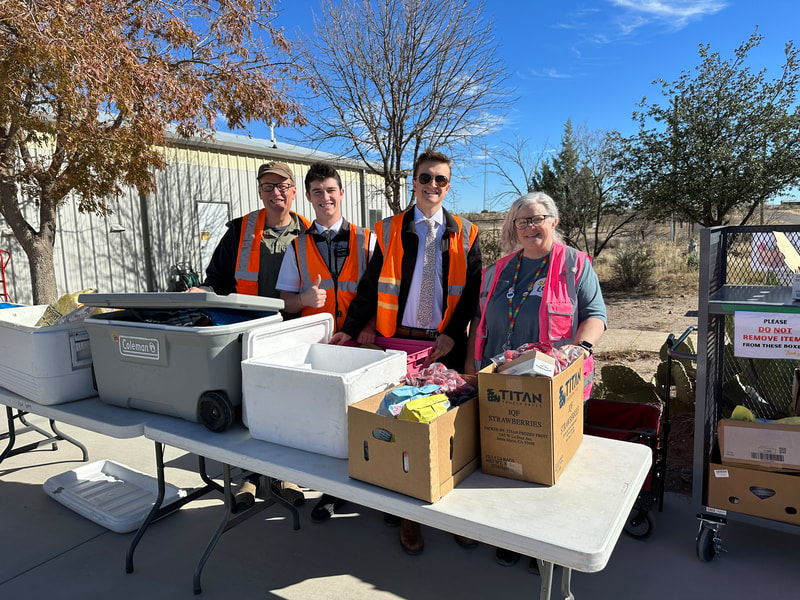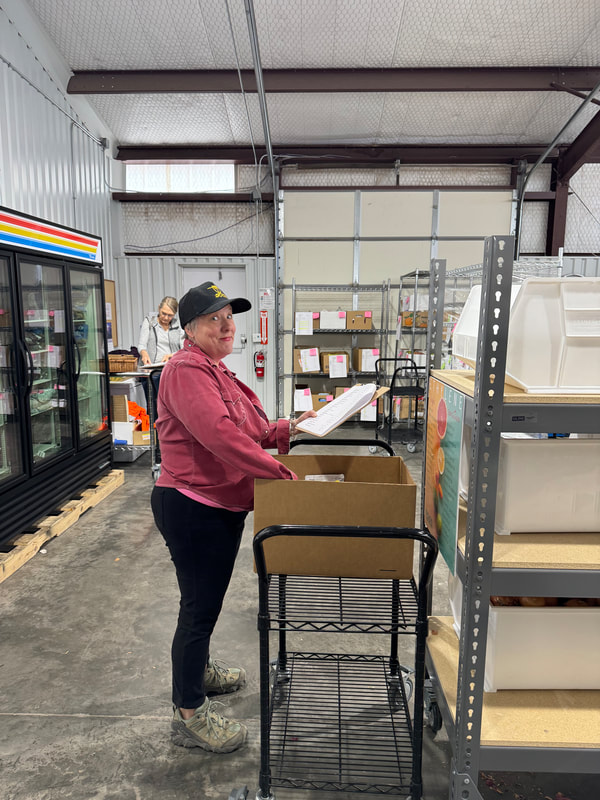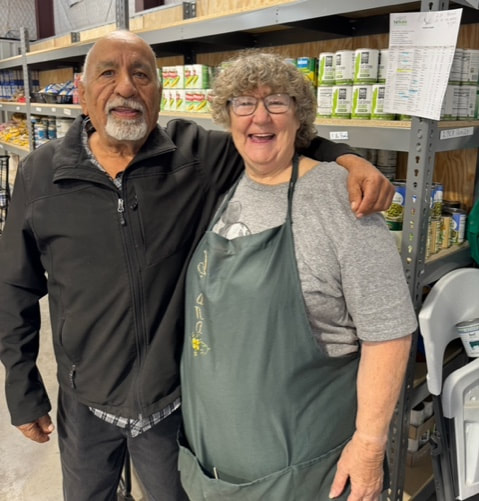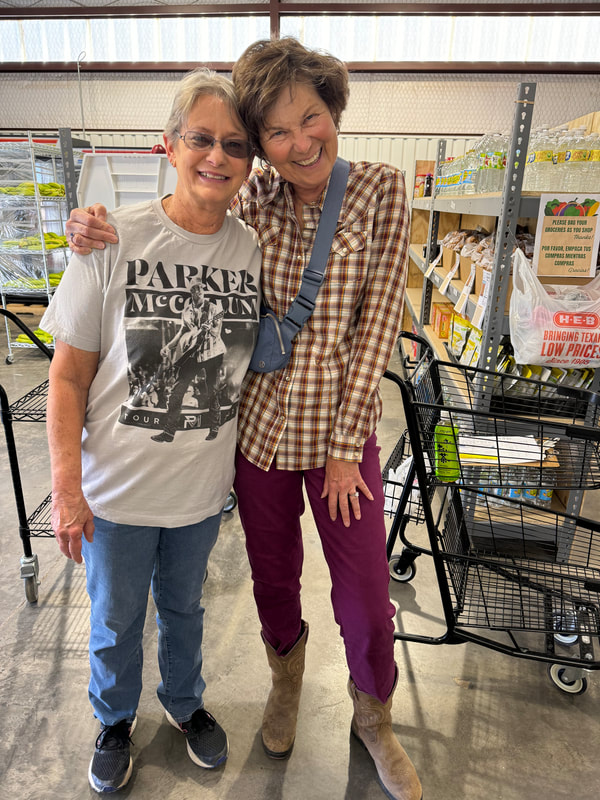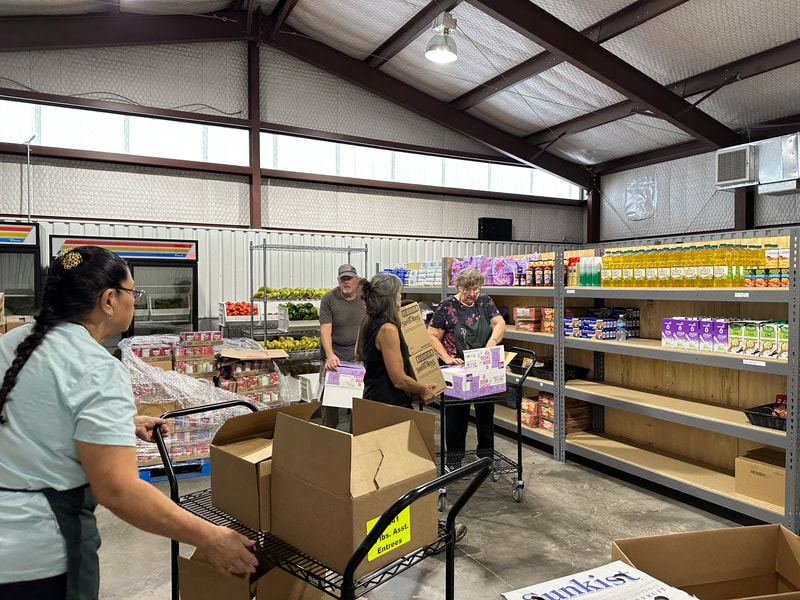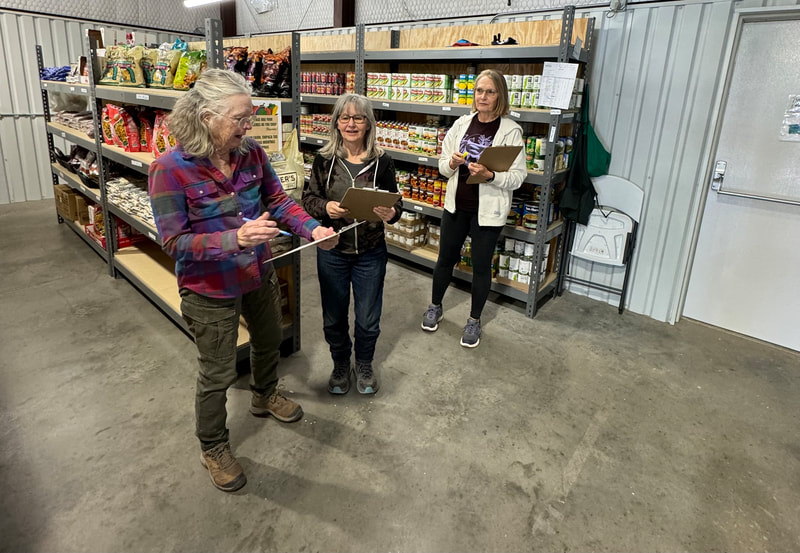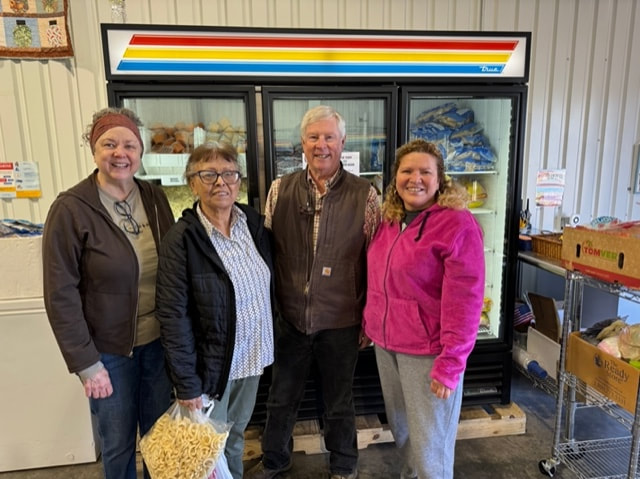Our Workplace Culture Statement reflects a commitment to fostering an environment that is inclusive, respectful, and empowering for all staff and volunteers while fulfilling our mission. At the core of our culture is a belief in the dignity and worth of every individual, both within our team and the community we serve.
WORKPLACE CULTURE STATEMENT
Since 1998, the Food Pantry of Jeff Davis County has been offering supplemental food assistance to 10-33% of the families in Jeff Davis County.
Our mission is to alleviate hunger and promote healthy eating for residents in need.
We believe that no one in Jeff Davis County should go hungry. We believe our entire community benefits when people are willing to meet the practical needs of others, as well as readily offer things of intangible nature (such as courtesy, kindness, compassion, and a listening ear) in order to affirm the value and dignity of everyone, including our colleagues, volunteers, and clients.
Every staff member and volunteer - from the janitor to the executive director - should understand that they are an integral part of the food pantry’s mission and success. Everyone constitutes a binding thread, tightly interwoven into our organization’s fabric - each doing its part to give the fabric its strength.
Our core values:
Mission first
Care deeply
Solve problems
What separates us from other food pantries:
- We value creative thinking and innovation. Just because we are small and rural doesn’t mean we can’t be forward-thinking and innovative in our approach to fulfilling our mission.
- We communicate directly and candidly.
- We retain only our highly effective employees.
- We look for ways to reduce complexity and keep things simple.
Valued Behaviors
Below are the specific behaviors and skills we care about most.
If these values describe you, and the people you want to work with, you will likely thrive here.
Generosity and Kindness
- You possess a spirit of generosity
- You treat clients, colleagues, and volunteers with kindness and generosity in order to foster a feeling of interconnectedness and a sense of community
- You offer kindness, compassion, and a listening ear to colleagues, volunteers, and clients
- You are generous at work with your time, knowledge, resources, and experience
- You give colleagues and volunteers space to explore, create, grow, fail, make mistakes, and most importantly, get back up and confidently go again
- You forgive and let go of resentments
- You make wise decisions despite ambiguity
- You use data to inform your intuition and choices
- You look beyond symptoms to identify systemic issues
- You spend our donors’ money wisely
- You make decisions mostly based on their long-term, rather than near-term, impact
- You seek what is best for our organization, not yourself
- You are humble and open-minded about other people’s ideas
- You make time to help colleagues across our organization succeed
- You debate ideas openly and help implement whatever decision is made even when you disagree
- You make tough decisions without agonizing or long delay
- You take informed risks and are open to possible failure
- You question colleagues’ actions inconsistent with our valued behaviors
- You are willing to be vulnerable, in search of truth and connection
- You give and take feedback to and from colleagues at any level
- You listen well and seek to understand before responding
- You are calm in stressful situations
- Your writing and thinking are concise and coherent
- You adapt your communication style so you can work effectively with different people, including those who don’t share your native language or cultural norms, or those who may be neurodivergent
- You work well with people of different backgrounds, identities, values, neurodiversities, and cultures
- You are excited to work with a diverse group of people where everyone feels welcomed and respected
- You recognize we all have biases and work to counteract them
- You take action if someone is marginalizing a colleague, client, or volunteer.
- You treat everyone with respect regardless of their position in the community or our organization
- You exhibit and are known for candor and transparency
- You only say things about colleagues that you are willing to share with them
- You admit mistakes openly and share learnings widely
- You always share relevant information internally, even when uncomfortable
- You act with good intent and trust your colleagues to do the same
- You care deeply about the mission and success of our organization
- You inspire others with your drive for excellence
- You are excited about your work
- You are proud to help people in our community
- You are tenacious and optimistic
- You develop new ideas that prove impactful
- You look for every opportunity to reduce complexity and keep things simple
- You challenge prevailing assumptions and suggest better approaches
- You are flexible and thrive in a constantly evolving organization
- You learn rapidly and eagerly
- You seek alternate perspectives to improve your ideas
- You see patterns and connections that other people miss
- You seek to understand our clients’ changing tastes, needs, and desires
Nonjudgment
At the food pantry, you will meet people who, on the surface, may appear "undeserving" of our services - people who drive Cadillacs and have "good jobs," people with mental health challenges, people who are addicted to drugs/alcohol. You may meet "lazy" people, "bad" parents, and others you may be quick to judge as "undeserving."
While we do have parameters for things like income and age in order to qualify for food pantry services, most of those are based on the honor system. We accept at face value what people report and do not require proof. To fulfill our mission and authentically live up to our value-based behaviors (such as generosity and kindness), we actively strive to let go of judgment and preconceptions about the people we serve.
Carl Jung said, “Everything that irritates us about others can lead us to an understanding of ourselves.” We often make snap judgments based on looks, race, nationality, perceived wealth, etc., and forget the fact that it is difficult to help someone while judging them.
When judging people, we recognize some or all of the following may be true:
- I don’t know this person’s full story, and therefore, I’m ignorant of what they are going through. “Everyone you meet is fighting a hard battle you know nothing about.”
- I may have unrealistic and unjustified expectations of people.
- I may subconsciously believe that I’m better than the person I’m judging.
- I may have lost sight of my own blessings of gratitude and compassion, resulting in judgment of those who aren’t as fortunate as I am.
- I may judge people who are different from me because I am biased, I have a limited worldview, or I am jealous.
Strategies for letting go of judgment include:
- Acknowledging people’s suffering (big or small, seen or unseen, physical or emotional);
- Recognizing that people who are most in need of compassion and kindness often ask for it in the most unkind ways;
- Giving people the benefit of the doubt.
Honest, Productive Feedback
At the food pantry, positive and constructive feedback is part of everyday life. Meaningful feedback can be hard to give or accept. But like any new habit, it gets easier with practice. So we help people learn to give and receive feedback through coaching and modeling the behaviors we want to see across the organization. It takes courage and selflessness to ask someone what you could be doing better or to ask yourself what feedback you have yet to share with a colleague. We value such courage.
Freedom and Responsibility
At some organizations, people ignore trash on the floor, leaving it for someone else to pick up. At other organizations, people lean down to pick it up, just like they would at home. We try hard to be an organization where everyone feels responsible for making us better. Picking up the trash is a metaphor for taking care of problems, small and large, and never thinking “that’s someone else’s job.” Creating a sense of ownership helps this behavior come naturally.
The role of the Food Pantry Executive Director is to inspire people more than manage them. We want our staff and volunteers to do what is best for our organization. This, in turn, generates a sense of responsibility, accountability, and self-discipline that drives us to do great work. Freedom itself is not the goal; the goal is creating a strong sense of caring for our organization so that people do what is best for the organization and our clients.
In some organizations, there is an unhealthy emphasis on process and not much freedom. We work hard to maintain excellence and keep our business as simple as possible. We want to be an organization of self-disciplined, accountable people who discover and fix issues without being told to do so.
Freedom can (and does) lead to chaos when we fail to couple it with a strong sense of responsibility. That is why freedom and responsibility go together.
There are a few important exceptions to our keep-it-simple, pro-freedom philosophy. We are strict about ethical and safety issues. We have no tolerance for harassment, for example. We also have strict controls around donor and client information. But these are edge cases.
In general, we believe freedom and rapid recovery are better than trying to prevent error. So we are relatively error tolerant except where safety, confidentiality, and ethics are concerned—and we focus on ensuring that any error prevention efforts don’t limit inventive, creative work. Rapid recovery is possible if people exercise good judgment.
Disagree, Then Commit
If a staff member, volunteer, or client disagrees on an important issue, it is their responsibility to explain why, ideally in person and in writing. Discussion clarifies the different views, and concise writing of the core issues helps people reflect on the wise course. It also makes it easier to share views openly and widely. The Executive Director has the responsibility to welcome, understand, and consider different opinions, even if they don’t agree. Once the Executive Director makes a decision, we expect everyone—including those who disagreed—to commit and help make the outcome as successful as possible.
Ethical Expectations
Beyond candor in our day-to-day interactions, we act honorably, even when no one is looking. One test we use is to ask whether we would be ashamed if our actions were made public—and avoid doing anything where the answer would be yes.
Separately, we handle lots of sensitive client and donor information that must be kept confidential. We expect all staff members and volunteers to protect confidential information, whether or not it is marked “confidential”.
Finally, Antoine de Saint-Exupéry, the author of The Little Prince, shows us the way:
If you want to build a ship,
don't drum up the people
to gather wood, divide the
work, and give orders.
Instead, teach them to yearn
for the vast and endless sea.
Food Pantry of Jeff Davis County is an equal opportunity provider.
USDA Nondiscrimination Statement: In accordance with Federal civil rights law and U.S. Department of Agriculture (USDA) civil rights regulations and policies, the USDA, its Agencies, offices, and employees, and institutions participating in or administering USDA programs are prohibited from discriminating based on race, color, national origin, religion, sex, gender identity (including gender expression), sexual orientation, disability, age, marital status, family/parental status, income derived from a public assistance program, political beliefs, or reprisal or retaliation for prior civil rights activity, in any program or activity conducted or funded by USDA (not all bases apply to all programs). Remedies and complaint filing deadlines vary by program or incident. More info on the USDA website.

